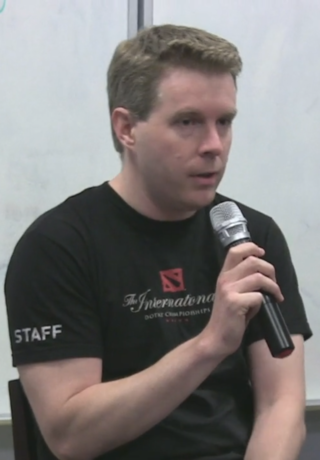Robin Walker (game designer)
Australian video game designer From Wikipedia, the free encyclopedia
Robin Walker (born 1975) is an Australian video game designer best known for co-developing Quake Team Fortress, Team Fortress Classic, Team Fortress 2, and Half-Life: Alyx.
Robin Walker | |
|---|---|
 Walker in 2013 | |
| Born | 1975 or 1976 (age 48–49)[1] |
| Nationality | Australian |
| Alma mater | RMIT |
| Occupation | Video game designer |
Career

Walker attended RMIT University in Melbourne, Australia.[2]
Together with John Cook and Ian Caughley, Walker started working on Team Fortress as a mod for id Software's QuakeWorld in 1996. Due to the popularity of the product, the team was hired by the then-small Valve to work on Team Fortress Classic and later on Team Fortress 2.[3][4]
Walker has played development roles in various Valve games, including Half-Life 2 and Dota 2.[5][6] More recently, Walker has been focused on the collision of economics and game design, in an attempt to transform Team Fortress 2 into a free-to-play, microtransaction-based game.[7] Walker worked on Valve's flagship virtual reality game, Half-Life: Alyx, released on March 23, 2020.[8]
Influences and philosophy
Summarize
Perspective
Walker used Team Fortress 2 updates to research what additional features are and aren't popular. The results of which he has used for the development of Dota 2,[6] as well as for later Team Fortress 2 updates. Walker also stated that he cannot guarantee that he would keep working on Team Fortress 2 indefinitely and that at some point, he will move on to a new project.[9]
Walker believes in the importance of communication between players and developers of modern PC games, stating that "being close to your customers – being able to talk directly to your customers – is valuable." In his experience, successful multiplayer games "innovate in gameplay both on release, but also over time post-release, and that those innovations are significant and of interest to customers."[10]
Walker is notably not worried about video game piracy, stating that to fight piracy, he is "looking at the things that pirates are providing and asking [himself] how [he] can provide something better than that." By releasing frequent updates of his games after launch, he constantly improves on his games in a way that pirates could not keep up with.[10][11] Walker is a supporter of the free-to-play model, as he says that the model supports a wider variety of customers, including those with "very little money," and that such a variety of players results in greater opportunities for richer experiences.[12][13]
Selected credits
| Year | Game title |
|---|---|
| 1996 | Team Fortress (Quake modification) |
| 1998 | Half-Life |
| 1999 | Team Fortress Classic |
| 2000 | Counter-Strike |
| 2000 | Gunman Chronicles |
| 2004 | Half-Life 2 |
| 2005 | Half-Life 2: Lost Coast |
| 2006 | Half-Life 2: Episode One |
| 2007 | Half-Life 2: Episode Two |
| 2007 | Portal |
| 2007 | Team Fortress 2 |
| 2008 | Left 4 Dead |
| 2009 | Left 4 Dead 2 |
| 2011 | Portal 2 |
| 2013 | Dota 2 |
| 2020 | Half-Life: Alyx |
References
Wikiwand - on
Seamless Wikipedia browsing. On steroids.
